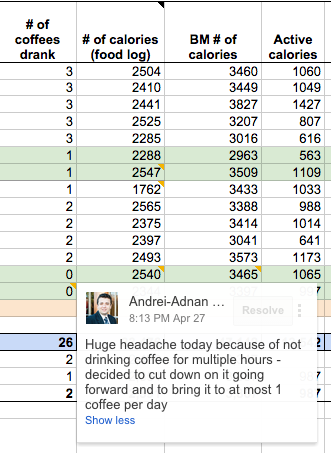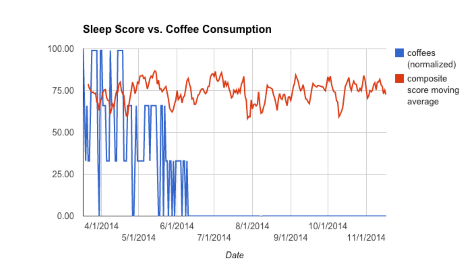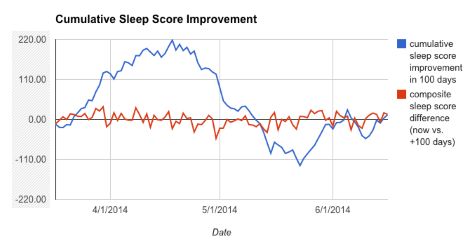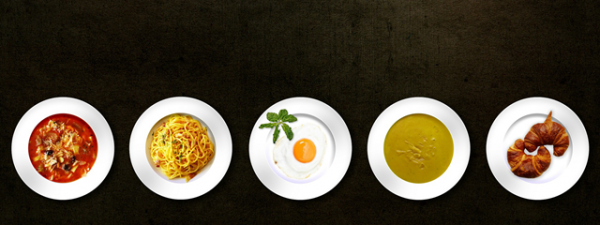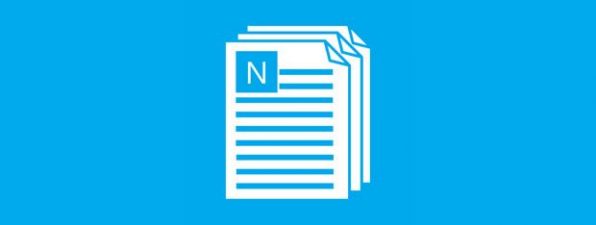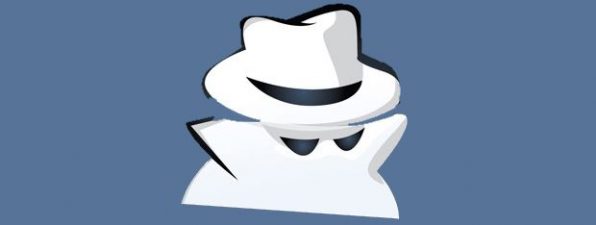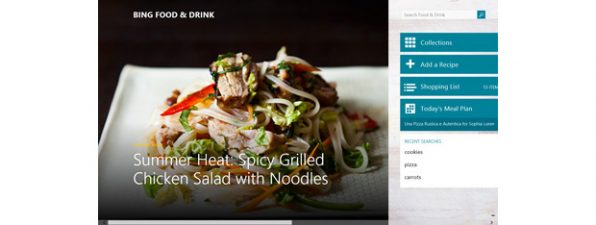
Have you ever found yourself getting through a day with excruciating headaches and then remembering that you forgot to drink coffee? You're not the only one. There is a very large number of people trying to quit coffee. A simple Google search yields a comparable number of results for "quit coffee", "quit alcohol" and "quit drugs". Impressive, right? Yet, nobody really pays attention to this one that much. And while the other 2 habits are blamed by society, coffee is actually endorsed. That's why, in this article I am going to describe how I ended up deciding to quit drinking coffee, my method for doing it and the impact it had on my sleep and energy levels. Being a quantified self geek with over 9 months of detailed data about myself, I am able to correlate a number of vital signs to the experiments that I do on myself. Let's get started:
My History With Drinking Coffee
I started drinking coffee in the 9th grade. I was taking part in the math olympiads and I was spending a lot of nights trying to research math concepts and solving problems. Why did I do that? For several reasons. First off, I had company: I was not the only one online as a night owl trying to solve complicated math problems. Second, my high school was going through some renovations, and we were scheduled to go to class in the afternoon and in the evening. It was the perfect excuse to stay awake most of the night, right?
Towards the end of my high-school years, things got worse. In the winter of my final year, I was trying to apply to several US universities while keeping everything else together. I ended up doing one whole month of 4-hour nights, and the cherry on the top was a 48-hour marathon to finish everything and have the applications shipped in time.
Then came the University. We would stay up late reading stuff that we were interested in, occasionally partying or trying to cram everything before an exam. You should go and visit our university's classrooms in the nights before the exams. You'll be surprised how many people you will find there sleeping (err.. I meant studying). In those days, I would drink coffee mindlessly without even bothering to count the cups in any way. Besides, coffee is cheap, right? You can get a nice cup of coffee in many places in Bucharest for about 50¢ to $1.
During my university studies, I started to work with an old friend who had just been promoted to team leader in a global company. Naturally, I did this at the toughest moment in the curriculum, the final year, when all other colleagues were quitting their jobs. It was so nice to be a badass, right? I ended up working 90-100 hour workweeks and sometimes not seeing the light of day. Even though the part-time job itself was taking up a small proportion of that.
Then I finished university and I quickly decided to go towards a PhD. I thought to myself that getting paid a little would ensure that I could work on whatever I wanted to, while getting paid. Little did I know! I had to work my ass off to make room for research while performing my other duties (being involved in European projects and teaching). Whenever I felt I could not go on anymore, coffee was always there, close by. A trustworthy friend!
Finally, I got so frustrated with academia, that I joined a tech startup. While initially wanting to drop out of PhD, I decided to finish it and went through 6 months straight of working non-stop, day and night, weekend or weekday. At this point, things were really getting out of control. Drinking 4 cups a day (and people, especially from the US, repeatedly told me how strong Romanian coffee is). And supplementing that with plenty of chocolate.
And it did not get any easier afterwards. As soon as I finished my PhD, we ended up getting acquired and shipping a massive project at the same time. And so on.
At one point I decided that my relationship with coffee had to change.
Motivation - What Triggered My Decision To Quit Drinking Coffee?
There's quite a bunch of us out there who are frustrated with the way coffee took over our lives. Take a look around you, while in the supermarket or in the shopping mall and you'll start realising the size of the coffee industry. Pay close attention to the caffeinated products section in the supermarket, or to the daily routine of your loved ones. How does their day start? With coffee, right?
I decided to quit coffee once I realised the following facts:
- Forgetting about it, or trying not to drink it in a particular day was giving me a really hard time. So it's either I keep this substance in my body all the time or not at all.
- I was using it to silence the signals my body was trying to send me. Whenever it would tell me it's tired, I would shut it up with some coffee (and maybe some chocolate).
- My relationship with coffee had degraded over the years, and did not improve. It did not even remain constant. One or two coffees were required just to "get started" without having any real effect.
Quitting Coffee, Reinvented
I admit, I did not research any methods at the time. Maybe I just had a crazy confidence that I can do it by myself. Looking back, I was naive at best. Because a failed attempt will dramatically decrease your chance of quitting in the future. In terms of food, that translates to: the more failed diets, the more chances of not ever being thin.
All I had in mind is one guiding principle that I apply to most of my life improvements: make small, gradual improvements that are sustainable and measure before acting.
When I had decided to quit coffee completely, I was already cutting down on it. The previous months were filled with Coke and coffee, and I was getting worried. I started measuring first, and discovered that I was drinking about 30 coffees in a 2-weeks interval, and most of them during weekdays. After seeing the numbers, the perspective of getting to zero was pretty daunting.
The key at this point was to regard it as a long term process. A year has 52 weeks. If I found a way to diminish the number of coffees by 1 every 2 weeks, I will be done within a year! Of course, it would take the discipline of entering data myself, because there was no Vessyl back then. However, my personal theory is that given a good enough benefit, people will do the data entry themselves instead of looking for an automated way.
In literature that is related to quitting smoking, what I was trying to do is named "gradual reduction". There are multiple schools of thought, and they are mainly divided among this method (or similar) and quitting altogether abruptly ("cold turkey"). Gradual reduction and its derivatives have proven to be much more effective in trials (by measuring relapse after 6 months or 1 year).
It took me a total of 8 weeks to quit coffee altogether. And at the end I had the ultimate test: travelling to the US and back in 5 days for a conference — and not drinking coffee! I passed this one with flying colors although it was hard and I think I managed to get through jet lag more easily because of the lack of coffee.
My Sprints For Quitting Coffee
I am a software engineer and I approach almost everything with an engineer's perspective. Learning from the agile methodology, I approached quitting coffee in 2-week sprints. Here I will give a short overview of my sprints. It took me a total of 4 sprints from the moment I decided to quit to doing it - about 56 days:
- Sprint #1 (March 17th - March 30th) — only measured the coffee I drank. Result: 28 cups.
- Sprint #2 (March 31st - April 13th) — only measured the coffee I drank. Result: 26 cups.
- Sprint #3 (April 14th - April 27th) — only measured the coffee I drank. Result: 26 cups and a huge headache on the last day (April 27th), because I had forgotten to drink coffee. This is when I really decided to quit.
- Sprint #4 (April 28th - May 11th) — added the goal of drinking a maximum of 20 coffees. I was helped by the fact that I visited London between May 1st-May 4th, so I did not really have to wake up to an alarm clock during a few of those days. I ended up getting by on one coffee per day during my London visit, and on 2 daily coffees for most of the other days.
- Sprint #5 (May 12th - May 25th) — I realised that my previous goal was too aggressive and highly dependent on context. I decided to improve my previous goal only by a little and set it to a maximum of 17 coffees. In the first week I drank my coffee only during weekdays, and I was struck by a nasty cold in the second week. That prompted me to rest more in order to get through it, and I barely reached my goal. This proved to be context-dependent again.
- Sprint #6 (May 26th - June 8th) — changed my goal again to drinking only 14 coffees and I ended drinking only 10. I was away at the seaside with my wife and friends in the June 7th-June 9th period, so that helped a bit with my mental dependency as well. I was very encouraged by the fact that I was managing to be productive during the day even without coffee, as my comment from May 28th reads: "productive workday with 0 coffee. YAY!".
- Sprint #7 (June 9th - June 22nd) — during this sprint I drank my last coffee in the first day (June 9th), and decided to go cold turkey at this point. I had gathered enough momentum and I had a very good test coming up in the next week, so I took the plunge. The most difficult part of this sprint was that while at the conference in USA, I was feeling groggy all the time and they only had black tea or green tea at best, which I tried to avoid at all costs. However, I over-compensated for my tiredness (an average of about 4 hours of sleep a night, including sleeping on a plane) with eating a lot of junk food. Even though I successfully reached my coffee goal at the end of the sprint, I did it at the cost of other health-related aspects: gained 2 kg (4.4 lbs) and was unable to find the mental energy to log my food.
How A Sprint Works
First of all, I check my sprint's dashboard (usually a Google Spreadsheet) each morning in my daily routine. I made the entry barrier really low by placing my data in a spreadsheet, because I knew that my morning routine can be disrupted very easily by weekends and trips. Just looking at the target and at the current progress will make me aware for the rest of the day of what I have to pay attention to.
While I gradually progress through the sprint, I naturally tend to become more ambitious towards the end to achieve my goal. This is where it's really important to have less aggressive goals - it will be easier to scramble to meet them and it will be more plausible that they are reachable.
Towards the end of the sprint, I start to think about the goals for the next one. I usually had 2-3 goals for a sprint, and usually one of them would be related to weight (because I was losing weight at that point).
After each sprint I would have a small sprint retrospective, to understand why I achieved (or failed to achieve) my goals, and how they should be approached going further.
I try to avoid having more than 3 goals for one sprint, because I find it difficult to focus my mind on so many results. Probably, what works best is having only one goal, but that takes a degree of patience that a lot of people (including myself) don't have.
Does Quitting Coffee Improve Your Sleep Quality?
I was quite excited to dig up my sleep data from my BodyMedia and to see whether there are any longer term improvements in my sleep quality after quitting coffee. My conclusion is that there are, but they were disrupted by my making other important life changes (like changing the career path). Also, I "only" have about 8 months of data about myself. And that might seem like a lot, but when you will try to crunch it, you will notice that you need much more.
To this end, I invented a sleep score for myself that is the average of the following 4 metrics, that I call "composite sleep score":
- Sleep score for the whole night (percentage of the time lying in bed in which I was actually sleeping).
- Sleep score for the first hour (this is because I used to have problems falling asleep; I am a hyperactive person and drinking coffee did not help either).
- Time to fall asleep (number of minutes it takes to fall asleep). This is not accurate because the sensor cannot distinguish between me watching a movie or me struggling to fall asleep. In the future, I will think of a way to measure that.
- Number of sleep intervals detected by BodyMedia (or, in sleep parlance — the number of toss & turns).
Each of these metrics was normalized to 0-100 and they were averaged. I did the same for the number of coffees (multiplied by 33, because while I was logging them I did not drink more than 3 coffees a day), and I compared them in the following graph:
The graph shows an increase in sleep quality (the red graph) towards July and the beginning of August. It's followed by an obvious plunge, because I was changing jobs, which is stressful for anyone. As you can see, now my sleep score is much more stable and it is more and more often above 75.
For sleep, I used the moving average (a mathematical formula where the older values matter less than the newer values), because I was trying to better see the longer term trends. At first, I was disappointed that there was no clear upwards improvement. But I guess I had set my expectations wrong in 2 ways:
- No sensor can measure how well rested you are in the morning. This is what actually improved after quitting coffee. I will think of a way to measure side effects of that on the longer term, in order to perform more experiments.
- Even a 10% improvement is not that plausible; that would mean that in a year or two, given enough ambition, I will be able to reach a near-perfect sleep.
Since I had a total of 7 sprints (about 100 days) before quitting coffee, and about as much data about sleep afterwards, I decided to compare the sleep score for day D and day D+100, graph it and accumulate it. This would tell me if I was indeed sleeping better or not.
And here it is. The big blue graph you see is the increase in sleep quality that I got over a period of 3 months (whenever it's above the groundline, it means that cumulatively I was sleeping better than the previous period of time).
This graph is quite plausible. I went through a more stable period immediately after quitting coffee, where I tried to get a bit more rest and charge my batteries. And recently, I've started to work on a set of personal projects really intensely (including these articles), which explains the relapse in sleep quality. However, there are two really important points:
- The big upward hill of the cumulative sleep score means that I was constantly getting better sleep than I was getting before for a good period of time.
- The fact that even though I went through a rough period, I am recovering right now shows that my ability to go through rough periods has not changed due to quitting coffee. Which is a major accomplishment in itself.
Other Benefits for Quitting Coffee
First of all, I start my day quicker. I gained 5 to 10 extra minutes each day which went into preparing the coffee and drinking it.
I wake up more rested, even after fewer hours of sleep. And I tend to rest more whenever my body tells me that it's time. My productivity has improved considerably because of this, and I tend to be more focused on what I do.
Going to sleep is much easier now. Because I also practice intermittent fasting (IF), by the late hours of the evening I am really tired and a few minutes of reading on my Kindle is just enough to get me to sleep quickly and efficiently.
Most importantly, I know my body better. I know which foods feed it correctly, and which don't, and how I can influence its energy levels. Now I can run, but I can't hide. There is no coffee to suppress the signals it's trying to send me.
Conclusion
First of all, it feels great to have coffee out of my system. But it's a deeply ingrained habit and social event, especially in office jobs, and it is very hard to get rid of it. I miss my morning coffee with my wife, or with my colleagues.
The concept of incremental gains has proven very successful in quitting coffee - and the rewarding thing was that I could organize my activity as a software engineer (using sprints). Once more, there is solid proof that the process is more important than the result.
I was quite pleased to see that the status quo can be challenged. Do I really need coffee? Maybe not. Does it harm you? That was definitely the case for me. Do you have similar stories? I would love to hear yours!
Andrei Ismail is an experienced software engineer with startup experience under his belt and a PhD in Artificial Intelligence. He has lost 50 pounds in 6 months and is currently working on a fitness coaching program for geeks, available at WEIGHT LOSS FOR ENGINEERS.


 16.12.2014
16.12.2014 